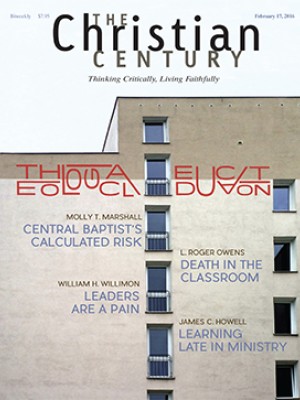Third Sunday in Lent: Isaiah 55:1-9; Luke 13:1-9
One of the lessons I try to teach the young people I know is this: never give the best of yourself to someone or something that can never love you back.
I’ve been surprised at how much this advice resonates with young adults. It becomes a measure not just for judging boyfriends and girlfriends but also for asking the larger questions in life. Discernment about vocation and calling becomes more focused. Questions of meaning take center stage.
Most surprisingly, this lesson generates discussion in young people’s families about how they use precious resources like time and money. I have been amused that it is these discussions, more than any about dating or sex or love, that trouble their parents.
Read our latest issue or browse back issues.
We do not talk about idolatry much anymore, despite the caution against it in everything from the Ten Commandments to the New Testament epistles. This is ironic, because idolatry flourishes in our culture. We have not yet started building literal golden calves, but we have all spent plenty of time worshiping at equally dangerous altars. Money, success, popularity, greatness, security—these are powerful gods. And in worshiping these gods, we have too often driven ourselves to the point of living overwhelming lives.
Isaiah asks us, “Why do you spend your money for that which is not bread, and your labor for that which does not satisfy? Listen carefully to me, and eat what is good, and delight yourselves in rich food.”
In her book Overwhelmed, journalist Brigid Schulte shares this shocking fact: “The average high school kid today experiences the same level of anxiety as the average psychiatric patient of the 1950s.” What’s more, stress in children “can alter not only their neurological and hormonal systems but also their very DNA.”
As it turns out, we have created a culture that is literally making our kids sick and actively rewiring them, and not for the better. We may have smartphones and advanced placement and conspicuous consumption, but we are not very wise. We focus on what doesn’t matter first, and we get around to what matters more than anything else only if we have the time. We spend our money for that which is not bread, and our labor for what does not satisfy.
But what if it does not have to be this way? In Lent we are called to turn away from the things that can never love us back and toward that which is good and rich—that which can fill us. Counter to the narrative we often write for ourselves, however, we are not called by a God who speaks to us casually, without urgency. We are called by a God with time-sensitive conviction.
In this week’s Gospel passage Jesus tells a story about a fig tree, a gardener, and a landowner. Year after year the tree fails to bear fruit. Tired of wasting good soil, the landowner tells the gardener to cut it down. But the gardener refuses to give up and negotiates for a one-year reprieve for the tree. They pledge to take care of it and shore it up with good soil. If even after all of that it does not bear good fruit, the gardener says, then you can cut it down.
I often want to ask people I know, people who feel overwhelmed by the demands of life, why they keep living like this. Why do you make the choices that leave you overextended and exhausted? Do you want to live a life utterly devoid of abundant new fruit? Why do you give the best of yourself to the things that can never love you back?
We all want to believe that we have infinite time to start loving the right things, eating that which will satisfy us, and bearing good fruit. But despite the urgency that defines the rest of our lives, scheduling everything from the car pool to the 401(k) contribution, we respond to Christ’s call to transformation by hesitating. There is always tomorrow.
In Lent, pastors have a unique call to preach with urgency. Our transformation can no longer wait. We have failed to bear good fruit for far too long, choosing instead to focus on those things that will not bring us joy. The good news for both preacher and congregation is that there is great freedom in proclaiming to the people of God that they no longer have to wait to focus on what matters the most. Now is the time to put first things first—no excuses.
This urgency does not come from a fear that God will smite us. I do not believe that God wants to destroy us the way the landowner wants to destroy the dormant fig tree. But I do believe that Jesus speaks with urgency because he knows how quickly most of us are destroying ourselves. And I believe God wants better for us than that.
God wants us to have new life, and this life will begin only when we put our spiritual houses—and our priorities—back in order. Only when we embrace God’s call on our lives will we find that we can once again bear spiritual fruit. That will happen when we start telling one another the hard truth: the clock is ticking, the time is now, and life is too short to waste another minute on what can never love us back.






